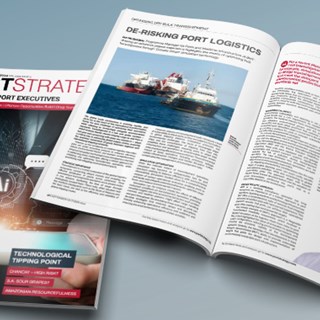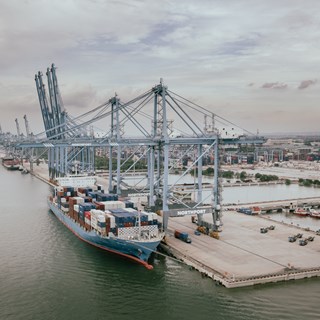BMT’s Chief Executive Sarah Kenny delivered this key note speech at London International Shipping Week (LISW) Conference on 12th September 2019.
***
Ladies and Gentlemen, Good afternoon. I am delighted to have the opportunity to take part in London International Shipping Week, and I would like to thank the organisers for asking me to speak today on this important topic.
In my role as Vice Chair of Maritime UK, I continue to learn much about the broad and diverse scope and activities of our global Marine and Maritime sector, and its future potential. Looking at this through a UK lens, we are a sector who contribute £46bn of value per annum to the UK economy, support over one million jobs, and ensure the successful conduct of 95% of our trade in goods overall. And, with substantial global market growth predicted to reach $3 trillion by 2030, I have to say I am both inspired and excited by what I see.
This, then is a sector with undoubtable and considerable impact! And, turning the theme of ‘impact’ towards the topic under discussion here today, I am reminded that an old boss of mine once said that ‘empowerment without measurement is abandonment’. Perhaps this statement chimes with you, perhaps it doesn’t, but in the context of the significant global environmental challenges that we all face, and given our already considerable role in shaping our maritime environment and economy, and faced with the huge market growth opportunity over the next thirty years as a maritime sector, I believe that we bear a great deal of responsibility and accountability for being environmentally and socially responsible for the way we capitalise on our future opportunities. In short, we cannot and should not expect to be empowered to do the things we do, without being wholly accountable and responsible for our collective impact on the environment.
The leadership and vision encapsulated in the UK Governments ‘Maritime 2050’ report, supported by the UK Department for Transport’s recently published Clean Maritime Plan, clearly commits the UK to take a leading role in the in the global challenge to meet net-zero carbon emissions in our sector. The plan charts the UK’s course to achieving this target, with a major focus on technology and innovation, driven by partnership between Government, academia, and Industry.
And this truly is a global challenge, not just one for the United Kingdom. The International Maritime Organisation has set our sector a significant and progressive challenge - to reduce our carbon emissions by 50% by 2050. To meet both the IMO and the UK net-zero challenge will demand an unprecedented level of collaboration across the sector, and more broadly. This is not simply the responsibility of shipowners and operators, but extends to include everyone in this room today, and many of those outside.
Therefore, in responding to the question “is it realistic to expect shipping to emit zero carbon by 2050”, we need to recognise that shipping is part of an overall value chain for the distribution of freight and goods around the world. As such we must include other elements of this value chain such as ports and harbours, transport and distribution networks, supporting services such as insurance, brokerage, trading and information systems, consumers, supply chains, and, of course, pay deference to our global geography.
In thinking about our sector on a more holistic level, which in itself is a challenge, we must also make sure that in striving to meet the net-zero emissions and clean maritime ambitions, we do not simply transfer the problem outside of our sector, and generate new environmental issues elsewhere. We should also bear very firmly in mind that ‘clean maritime’ is not purely about emissions management – it is about our environmental footprint in a much broader sense, and we should sensibly aim to address our wider impacts, not just focus on emissions.
It should not come as a surprise that the clean maritime strategy seeks to build UK competitive advantage, developing innovation across the breadth and depth of the Maritime Sector - in technology, people, the environment, trade and our infrastructure.
As someone who runs a science, technology and engineering business in my day job, I could of course spend all day talking about the role of technology as the innovation, and please don’t worry, I am going to talk about technology! But I would like to note that I feel the topic of innovation is far too often conflated with technology - Innovation is really about applying our intellect to solve complex problems, in whichever context they appear. We will need to innovate very broadly to address the environmental challenges we face, and happily the UK has an excellent reputation for doing precisely this. We have led the way in the development of safety in maritime operations, and our historic and ongoing influence is evident in maritime regulation worldwide today. We are renowned as a world centre of expertise in maritime law, finance and insurance, and we have a world class reputation for maritime design, sea-bed and navigational charting, and oceanographic research.
So, returning to our zero emissions challenge – I see it as one of the most compelling complex problems that our sector is going to face for the foreseeable future, but, I also believe that here in the UK, because of our impressive track record in innovating in this sector, we are well placed to provide thought and technology leadership in delivering the zero emissions ambition, and I believe that we can achieve it.
And returning to a point I made earlier, I should also add that I believe that if we get this right, the maritime sector can not only meet its own challenge, but also contribute to carbon reduction in other forms of transport; for example by replacing traditional road transport solutions by using alternative maritime options such as short-sea shipping, thus reducing inland pollution and road congestion, whilst offering the opportunity to re-invigorate small ports and their communities around our coasts. We can also exploit new collaborative opportunities through working with adjacent sectors such as renewable energy, which also has a significant maritime component. Here I am minded of fixed and floating offshore wind, and initiatives such as the Swansea Bay Tidal Lagoon - a 320 Mega Watt pathfinder project being developed in South Wales. As a sector, I believe that an important step towards achieving our emissions targets would be to commit to using our sector expertise in helping these initiatives to succeed, and then committing to sourcing our energy from the capabilities they generate.
So, it is important, then, to recognise that the solutions to achieving this challenging target are broad and have very many facets. And, because as a techy I can’t resist talking about technology any longer, of course this is also very much about our ability to develop innovative technology solutions.
For example, lets briefly look at clean sustainable propulsion systems. A great example of this is BeHydro, A joint venture between ABC & CMB who have recently announced their aim to commercially launch the first hydrogen medium speed engine in the course of 2020. And this is just one example; projects are springing up all over the UK, including hybrid ferries in Scotland, and on the Portsmouth to Isle of Wight route. New shore-side capabilities are being implemented in Portsmouth, Fraserburgh and Brodick, to drive down emissions from ships alongside who would otherwise run their engines, and in Orkney a project is exploring how to inject hyrdrogen in to the fuel supply of ferries to reduce CO2 emissions.
Wow! So, perhaps with all this innovation, we are doing enough to get ready for 2050 then? Well, to be blunt, no!
We need to recognise – and quickly - that the ships of 2050 will start to be built now, and over the next few years. The investment needed to develop and realise the technologies I have just described, and the others we must also develop, therefore must come, and come quickly. And, in an industry of small margins and large capital costs, I believe that both collective industrial endeavour and Government support is essential.
This gives me a great opportunity to highlight the support that the UK Department for Transport has given to the Maritime Research and Innovation-UK initiative. This is a leading consortium of Government, maritime industry, trade associations, and academia. This initiative, even though currently in its infancy, is already starting to play an important role in acting as a hub to co-ordinate research and innovation activities in the field of zero emission shipping.
The first tranche of MarRI-UK funding is targeted towards Clean Maritime Innovation proposals – calls for which are open now. [a second call was announced only yesterday to address technology and autonomous systems Innovation]. MarRI-UK aims to provide sectoral leadership in marine and maritime research and innovation, to join up and co-ordinate research being done within the sector, and to provide timely ‘pump priming’ of the clean maritime research and innovation agenda in the UK.
Given the inevitable UK-centric focus on MarRIUK, the aim is to align research and innovation priorities with technology themes where the UK has been identified as already having a potential competitive advantage. Research commissioned by the Government assessed the UK’s competitiveness in 11 key clean maritime technologies and found that the UK has the strongest competitive advantage in hydrogen and ammonia production technologies, on-board batteries and electric engines.
This provides useful context for early targeted investment, but given that the zero emissions target is 30 years away, we can only guess at technology developments in that time scale. For example, it was only 30 years ago that Tim Berners-Lee invented the World Wide Web, and since then we have seen the introduction of GPS (1995), the international space station, growth of e-businesses, social media and video gaming. We are now seeing the introduction of the Internet of Things, 5G communications, advanced Robotics and Artificial Intelligence with mainstream applications, and in other areas of science we have mapped the human genome, discovered new particles in physics and seen tremendous advances in healthcare. Now, as the Fourth Industrial Revolution rapidly becomes our new reality, we must constantly review and refresh what can be achieved environmentally, and target that in the context of ongoing technological breakthroughs and not as a linear progression from today.
Technology, then, is one of many solutions we can apply to the clean maritime challenge. But I haven’t spoken about the common thread through all of this – our people.
Our collective success as a sector relies totally upon our ability to attract talent into the sector. To do this, we have to change perceptions about ships and shipping, and the maritime industries as a whole. We are an exciting forward-leaning sector with a huge breadth of careers, but yet we have not promoted ourselves that way. And we are in a global and competitive jobs market where this matters more than ever before. After all, the skills we require to develop the technologies I have mentioned today are fundamentally the same as in most other industrial sectors – and we are competing with them for our share of the best.
Much work is underway through programmes such as the MaritimeUK Women in Maritime Taskforce to address fairness, equality and inclusion within the maritime sector. The Taskforce brings together leaders from across the maritime sector to identify practical steps to increase the number of women in maritime, and crucially within senior roles across our shipping, ports, marine and business services industries.
In addition, Maritime UK has developed a Maritime Masters programme to strengthen links between UK industry and academia. The programme promotes academic excellence amongst students and their universities, whilst providing valuable research to support the maritime sector’s work. And of course the reference to ‘our people’ also extends to the way we lead and behave as a sector. I believe that to achieve the net-zero target, or possibly get there faster…and realise the considerable opportunities associated with it, we must build and foster a culture of collaboration within our sector, one that does not necessarily have a long tradition of collaborating.
So that requires change. We have made real progress on this, but there is more to do. It is now time for us, the leaders in the sector to work together to deliver on the ambitions of the Clean Maritime Plan. I urge government and industry colleagues to view the creation of MarRI-UK, the first truly national UK cross-sector vehicle for collaborative maritime research and innovation, as a key delivery engine for many of the technology recommendations within Maritime 2050 and for achieving the zero emission goal. We need however to pair this collective endeavour in to technology-led innovation with real and concerted leadership, broad stakeholder engagement, investment in to future skills, and our sectors brand image, and most of all we need to demonstrate and be clear about our ambition.
Importantly on that note, this week, leading UK maritime companies and trade associations have signed up to a charter committing us to support decarbonisation in our sector by 2050. So, let’s be more ambitious and imaginative. We must be less risk averse, break out of group think, we need to be bold.
50 years ago, man landed on the moon, because someone simply wanted to try. After just a decade of development – that ambition was realised. It took courage, vision, drive, determination, collaboration, and innovation. As an enterprise we need to be equally bold in delivering the zero emissions target. So, why don’t we be more ambitious and aim for 2040?
Ladies and Gentlemen, the future is incredibly exciting. The potential opportunities and rewards are vast for us as an industry, for our nation and for our planet. Thank you for listening.




